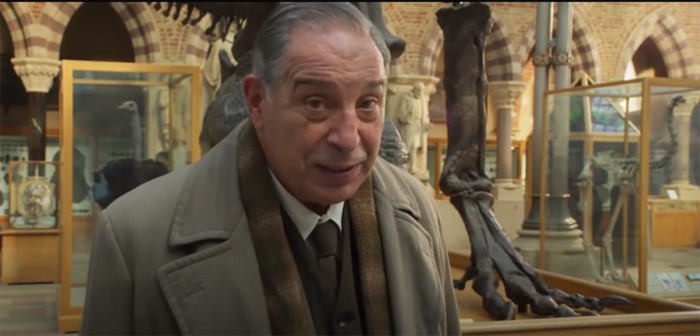
Max McLean, founder of Fellowship for Performing Arts, has spent the last two decades building a reputation as one of the leading voices in Christian theater. His latest work, “C.S. Lewis On Stage: Further Up & Further In,” now available on DVD and streaming, continues his mission of bringing C.S. Lewis’ life and ideas to a broad audience.
An award-nominated actor, McLean has been compared to Dallas Jenkins, the creator of “The Chosen,” and the Kendrick Brothers, largely credited for putting quality Christian films on the map. But his medium is theater — a space where few Christians have historically had a strong presence, especially in New York City.
“We’re in the theater niche,” McLean told The Christian Post in a sit-down interview. “What’s important to me is the content — and for the past 20 years, that content has mostly focused on C.S. Lewis.”
“Further Up & Further In” is a follow-up to McLean’s earlier play and film “The Most Reluctant Convert,” which explored Lewis’ journey from atheism to Christianity. McLean starred as an older C.S. Lewis in the film, which has been seen in cinemas and on video on demand in 127 countries.
The new production picks up after Lewis’ conversion and examines the impact of his faith-based work, particularly during World War II.
The play highlights how the BBC gave Lewis a platform during the London Blitz, where his talks eventually became the book Mere Christianity. McLean says the urgency of the war opened people’s eyes to mortality, and Lewis responded with clarity and a hopeful Christian message.
“We explore how the culture was hungry for something more,” McLean said. “Lewis was able to speak into that with clarity.”
The production also touches on Lewis’ extensive correspondence with readers. “People wrote to him with their deepest questions,” McLean said. “He responded to every letter, sometimes leading people to faith. In one exchange, he even told someone, ‘The Holy Ghost is after you. I doubt you’ll get away.’”
Founded in New York City, the Fellowship for Performing Arts produces stage and film projects from a Christian worldview. Past productions have included Lewis’ works “The Screwtape Letters” and “The Great Divorce,” along with “Martin Luther on Trial” and “Mark’s Gospel.” The company’s work tours nationally and internationally, often performing at secular institutions like UC Berkeley and the University of Florida.
FPA’s goal is to reach diverse, often skeptical audiences. “We want to be in the marketplace of ideas,” McLean said. “Our shows are done in performing arts centers and universities. We invite people from all backgrounds and then offer follow-up opportunities like discussion groups.”
According to McLean, Lewis’ writing is especially effective at engaging these audiences. “He had a steel-trap mind, could remember everything he read, and translate it into powerful prose and speech,” McLean said. “But he did it all under the headship of Christ. That’s what sets him apart.”
Though he died in 1963, Lewis remains one of the best-known Christian authors around the world. Over the years, his fiction writings have been turned into numerous family-friendly film and TV projects, including a 1988 BBC version of The Lion, the Witch and the Wardrobe and three movies produced by Sony Pictures that grossed more than $1.5 billion worldwide.
Netflix is also reportedly planning a reboot of The Chronicles of Narnia, starting with The Lion, the Witch, and the Wardrobe, helmed by “Barbie” director Greta Gerwig. Meanwhile, actor Jim Caviezel recently revealed he’s studying Lewis’ The Screwtape Letters for spiritual preparation as he prepares to reprise the role of Jesus in “The Resurrection of the Christ,” the forthcoming sequel to Mel Gibson’s 2004 film “The Passion of the Christ.”
Despite Lewis’ popularity, some critics argue that his writing hints at universalism, which is the belief that all people will eventually be saved. McLean disagrees.
“He believed in Hell and the need for it,” he said. “He (Lewis) said there are two kinds of people: those who say to God, ‘Thy will be done,’ and those to whom God says, ‘Thy will be done.’ Those in Hell choose it. That’s not universalism.”
McLean says Lewis took seriously the call to repentance and obedience. “He was very moved by the sheep and the goats metaphor in Matthew. He knew faith wasn’t just about belief — it required a response.”
Lewis’ insights into culture and belief continue to resonate, McLean said, pointing to The Abolition of Man, where Lewis warned about the consequences of rejecting objective moral truth.
“He saw it coming,” McLean said. “The idea that reality is something you create. He thought that was dangerous, and I think he was right.”
McLean also believes Lewis’ ability to appeal to both intellect and imagination is why his work continues to influence lives. Books like Mere Christianity have played a role in the conversion stories of figures like Chuck Colson and Francis Collins.
“Lewis didn’t shy away from the hard questions,” McLean said. “He understood the tension between what we feel and what we believe. He said if we feel but don’t act, eventually we become numb to both.”
The actor said he sees both opportunities and challenges ahead for faith-based theater. One of the biggest issues is finding strong writers who understand the Christian worldview.
“Everything starts with the writing,” he said. “If the blueprint isn’t solid, the final product won’t be either. We need more writers in the Christian space and the Church needs to support them.”
FPA is developing two more film projects, with a major announcement expected soon. McLean didn’t share specifics but confirmed the third project is based on a “significant property.”
McLean is also optimistic about engaging wider audiences — even those unfamiliar with or skeptical of Christianity.
“I work with secular writers and directors,” he said. “They’re not hostile. They just don’t know how to speak to our audience. These things are spiritually discerned — and it’s hard to write authentically if you don’t understand them.”
He added, “There’s room for collaboration. But the best work will always come from those who believe the message they’re trying to convey.”
Leah M. Klett is a reporter for The Christian Post. She can be reached at: leah.klett@christianpost.com


















